A History of the Mishnaic Law of Holy Things (6 vols.)
Digital Logos Edition
Overview
In this six-part series, Jacob Neusner, one of the foremost scholars of Judaic studies, translates and explains each tractate in the Mishnaic law of Holy Things. Neusner uncovers the history of the formation of early Rabbinic Judaism, down to the redaction of Mishnah in 200 A.D. Neusner evaluates the meaning of these tractates in their original contexts and analyzes which literary and intellectual traits these sources exhibit, providing invaluable insight into the Mishnaic Temple and the cult surrounding it.
In the Logos editions, these volumes are enhanced by amazing functionality. Important terms link to dictionaries, encyclopedias, and a wealth of other resources in your digital library. Perform powerful searches to find exactly what you’re looking for. Take the discussion with you using tablet and mobile apps. With Logos Bible Software, the most efficient and comprehensive research tools are in one place, so you get the most out of your study.
For more on Jewish history, check out Classic Studies in Jewish History during the Time of Jesus.
Looking for more from distinguished Jewish scholar Jacob Neusner? Try the Jacob Neusner Jewish Studies Bundle, 99 volumes on Jewish history, religion, philosophy, and more.

- Provides translations and explanations of each of the tractates in the Mishnaic law of Holy Things
- Gathers extensive research from primary sources
- Includes detailed appendixes, bibliographies, and lists of abbreviations and transliterations
- Title: A History of the Mishnaic Law of Holy Things
- Editor: Jacob Neusner
- Series: Studies in Judaism in Late Antiquity
- Publisher: Wipf & Stock
- Publication Date: 2007
- Volumes: 6
- Pages: 1,532
- Resource Type: Monographs
- Topic: Judaica
- A History of the Mishnaic Law of Holy Things, Part 1: Zebahim: Translation and Explanation
- A History of the Mishnaic Law of Holy Things, Part 2: Menahot: Translation and Explanation
- A History of the Mishnaic Law of Holy Things, Part 3: Hullin, Bekhorot: Translation and Explanation
- A History of the Mishnaic Law of Holy Things, Part 4: Arakhin, Temurah: Translation and Explanation
- A History of the Mishnaic Law of Holy Things, Part 5: Keritot, Meilah, Tamid, Middot, Qinnim: Translation and Explanation
- A History of the Mishnaic Law of Holy Things, Part 6: The Mishnaic System of Sacrifice and Sanctuary
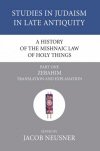
In the first of a six-part presentation of the Mishnaic law of Holy Things—that is, matters pertaining to the Temple and its cult—in which Jacob Neusner presents a form-analytical translation and explanation of Mishnah and Tosefta of the entire Order of Holy Things. This volume deals with the Mishnah-tractate Zebahim, which concerns the sacrifice of animals and birds in the cult.
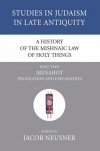
Jacob Neusner continues his translation and explanation of each Mishnah-tractate in the Mishnaic law of Holy Things, which center on matters pertaining to the Temple and its cult. In part two of this six-volume series, Neusner focuses on Mishnah-tractate Menahot, which deals with the various grain-based offerings in the Temple.
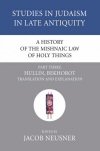
In part three of a six part series, Jacob Neusner continues his discussion on the Mishnaic law of Holy Things, which concern matters pertaining to the Temple and its cult. Here, Neusner offers a translation and explanation of the Mishnah-tractates Hullin and Bekhorot. Hullin deals with the preparation and use of meat, while Bekhorot focuses on three kinds of firstborn: man, the clean beast (the flock or herd deemed holy to be given to the priest), and the unclean beast (the donkey).
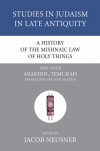
Part four of this series resumes Jacob Neusner’s discussion of the Mishnaic law of Holy Things, concerning matters pertaining to the Temple and its cult. Neusner translates and explains the Mishnah-tractates Arakhin and Temurah. Arakhin centers on gifts of the value of persons or property to the Temple, and Temurah deals with the rules of substitution when giving gifts in the Temple, such as exchanging one animal at the altar for another.
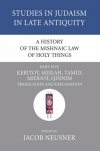
In part five of this series, Jacob Neusner continues to discuss the Mishnaic law of Holy Things, which concern matters pertaining to the Temple and its cult. In this volume, Neusner translates and explains five tractates in the Mishnah-Tosefta: Keritot, Meilah, Tamid, Middot, and Qinnim. The Keritot centers on the catalogue of offerings required for transgressions and penalties. The Meilah deals with the topic of sacrilege. The Tamid is a narrative on how the priest provides the daily-burnt offering. The Middot presents the measurements of the Mishnah's Temple. The Qinnim concerns settling affairs regarding the sacrifice of birds.
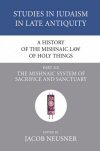
In the final volume of this series on the Mishnaic law of Holy Things, which concern the Mishnaic Temple and its cult, Jacob Neusner analyzes the Mishnaic system as a whole. He discusses the formation of each of the tractates and then explains how these laws unfolded over time. Neusner also interprets the Mishnaic system in various contexts, including the world of second-century Judaism and late antiquity.
Jacob Neusner is research professor of theology and senior fellow of the Institute of Advanced Theology at Bard College.